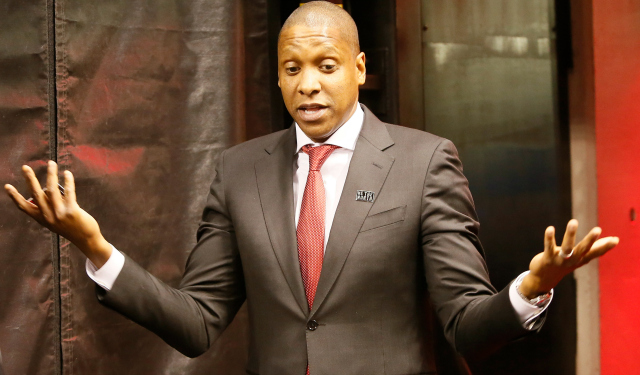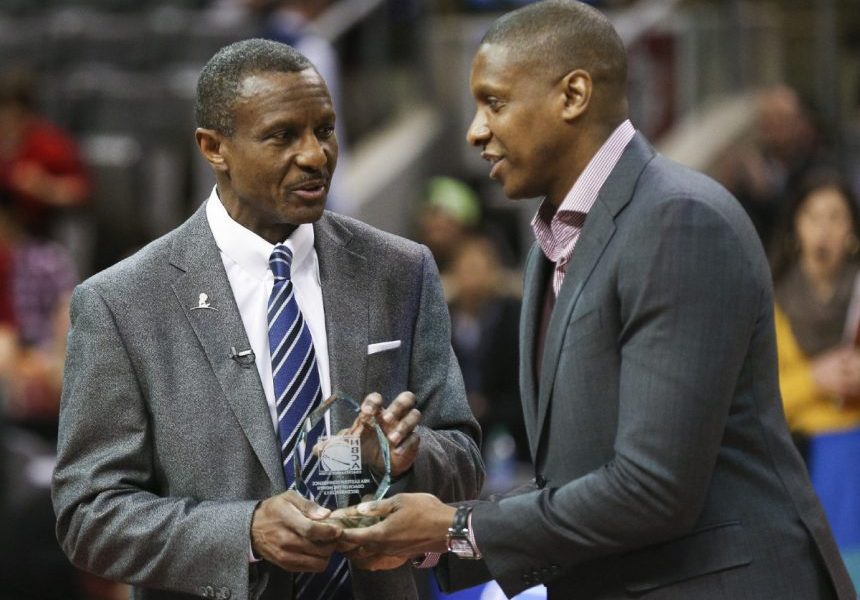For a press conference that was deemed useless (b.s., to be exact) by its subject on May 9, one quote grew legs and has carried for almost a month now. With each passing day, what Masai Ujiri meant when he said, “After that performance, we need a culture reset here,” has become harder to understand.
Dwane Casey told TSN1050 radio that he has received assurances that he will remain the head coach and has attended the team’s pre-draft workouts per usual. Ujiri has confirmed he has every intention of re-signing Kyle Lowry, and Toronto’s other franchise cornerstone DeMar DeRozan is already locked into a long-term deal. With three of the most influential components of the team all set to return, how does the culture reset?
Before looking at what can be gained through change, here are the benefits of keeping things the same:
A winning culture
This seems the most prideful aspect to maintain, one where the franchise continues to churn out 50+ wins and be a top-four seed in the conference. This builds equity with the upper echelon of players in the league, as well as those savvy vets that offer more in intangible value than on-court prowess.
To Ujiri’s credit, he made it clear during the press conference that his preference is to tackle the LeBron James problem head-on and not run away like cowards. A lot of that will come down to Kyle Lowry’s decision to stay or go, but the mindset is admirable.
In suffering these beatdowns at the hands of the Cleveland Cavaliers, the Raptors have ascended to the point where they can test themselves against the best in high leverage situations and figure out what works and what doesn’t. As we learned this past season, there is not much to be taken from playing the Cavaliers during the regular season. If the Raptors are truly going to become an elite team, they need to learn from the lessons being doled out to them in the postseason.
In getting outscored by 102 points from the three-point line over the course of four games, the Raptors have received a cold splash of water to their faces with regard to an aspect of their offense that is sorely lacking: volume three-point shooting.
A buying culture
To steal from soccer terminology, this Raptors offseason can help set up the Raptors as a “buying club.” Tottenham Hotspur are a perfect example of what Toronto’s basketball franchise is trying to become. Tottenham have long been known as sellers, a good team that could never quite challenge for the title as players would make their name at the club before finding better suitors. In the Premier League era (since the ’92-’93 season), they have finished as high as fourth and as low as 15th in a 20-team league. Over the past two seasons, the footballing Spurs have finished third and second and will be considered strong contenders for the Premier League crown next season.
In the past, they’ve lost players like Michael Carrick, Luka Modric, and Gareth Bale to the likes of Manchester United and Real Madrid, but now look likely to keep players of the ilk of Harry Kane, Hugo Lloris, and Dele Alli.
Lowry, Serge Ibaka, P.J. Tucker, and Patrick Patterson are all free agents, and the best teams find a way to keep their players. Toronto has been a “selling club” for far too long with the likes of Damon Stoudamire, Tracy McGrady, Vince Carter, and Chris Bosh all leaving for greener pastures, and the re-signing of Lowry and Ibaka will add a level of stability to the franchise unseen before. The MLSE would be shelling out more than they ever have for the Raptors in this scenario, which would show just how much they value winning.
Offensive culture
With or without Dwane Casey, the offense has to change. There needs to be more ball movement, more player movement, and more three-pointers. The team and its staff needs to recognize that their philosophies from the regular season aren’t transferable to the playoffs, and they need to find strategies that can do so.
One quote that concerned me slightly from Ujiri’s press conference was when he was asked if the team needed to follow the three-point path that has become the new vogue of the NBA. “I don’t like to follow what everybody is doing and I always feel that there’s a way to do it different, you know, because this is going to run out and someway somehow, there’s going to be another way to play.” Unless the league changes its rules, the three-point shot isn’t going anywhere and is here to stay. The analytics are too obvious to ignore, and it’s definitely something that needs to be embraced as it isn’t going to “run out.”
Whether it needs to be done to the degree that the Houston Rockets do it is another question entirely.
Drafting culture
The Raptors have had good, but not great results in drafting over the past few seasons. After not having a choice to make in 2013, they picked Bruno Caboclo 20th and DeAndre Daniels 37th in 2014. The next year was a home run with Delon Wright at 20 and Norman Powell at 46, before last year’s selections of Jakob Poeltl 9th and Pascal Siakam 27th.
The next couple of years will be decisive for Caboclo, while Daniels will likely never put on a Raptors uniform (a bit of a gut punch in hindsight, with the likes of Nikola Jokic, Dwight Powell, and Jordan Clarkson all still available). Poeltl looks a solid player, but like most big men that prefer the interior and lack a jumper, could have his ceiling capped based on the demands of today’s court geometry. Siakam looks as though he could be a solid rotation piece, and one can only hope that earning the D-League Finals MVP will only aid his development.
One thing that stands out with these six draftees, is a lack of shooting. Norman Powell has done exceedingly well to shake that tag off to become the most dependable source of 3-pointers in the 2017 playoffs, but that probably speaks more to the team’s overall struggles from that mark. Caboclo looks the best shooter of the lot after that, but it remains to be seen if he will actually get to that level.
The Raptors may already be changing their drafting perspective in this regard, as they worked out both T.J. Leaf and Tyler Lydon recently, two guys that project to be stretch fours in the NBA.
Huskies culture?
This is a blow-it-up scenario. If Kyle Lowry leaves for what he perceives to be a better opportunity, there is no sense in paying up for any of the other free agents. It would perhaps even serve the Raptors best to trade DeRozan and initiate a complete rebuild.
With that being said, a Raptors history where they have won a playoff round in just three of their 22 seasons and have hung their hat on division banners isn’t the most compelling. A full rebuild would be the perfect time to changeover to the Huskies completely, and start anew. There is already history with that name having played the first ever NBA game, and there could potentially be a cultural impact across the country as well.
There are many Raptors fans who have complained about the attention the Maple Leafs and Blue Jays get in comparison, and maybe it’s time to accept that if you can’t beat ‘em, join ‘em. The blue and white schemes of those teams resonate across the country, and might bring a greater sense of attachment for those outside of Toronto. Those two teams have won championships too, so maybe some of that luck can rub off on the basketball franchise in the long term. A re-branding would also mean syncing the Huskies with the ‘We the North’ slogan, a much more logical pairing compared to the Raptors that are just extinct.
One of the downsides would be bidding farewell to the beloved Raptor, but I’m sure Powell would be happy to serve up Apollo for a rallying cry.
Yes, I am aware that Apollo is a Pomsky and not a Huskie, but how could you not root for this?
With what I’ve brought up only representing a fraction of the decisions Ujiri needs to contemplate, it’s fair to say that this will be one wild summer in Toronto, one that could change the perception of this franchise forever.



